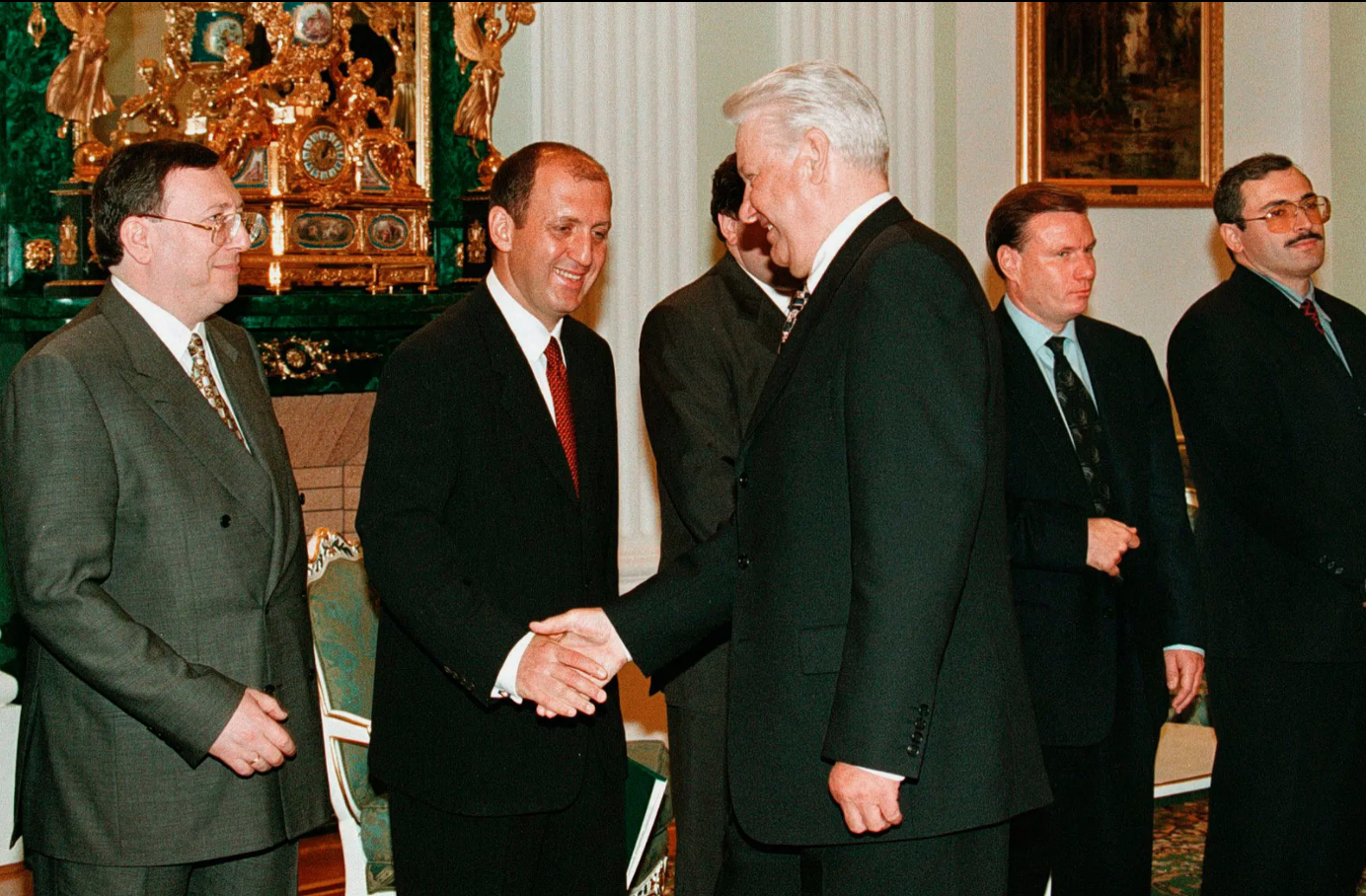Filed Under: Print > Journalism > Oligarchs collude for Yeltsin in 1996
Oligarchs collude for Yeltsin in 1996

Yeltsin shaking hands with with some of Russia’s richest men at a meeting in the Kremlin, March 1996. From left: Vladimir Gusinsky, Vitali Malkin, Mikhail Fridman (obscured), Vladimir Potanin, and Mikhail Khodorkovsky
In the lead-up to the 1996 presidential election, Boris Yeltsin’s ratings were underwater. The man himself had suffered four strokes, while the Duma’s majority and speakership were held by KPRF—the Communist Party of the Russian Federation. This party, established in 1993, drew on old Soviet party cadres, and, despite trying to distinguish its ideology from that of its predecessor (the Communist Party of the Soviet Union), used key topoi of Soviet nostalgia to attract voters dissatisfied with Yeltsin’s economic reforms. KPRF’s Gennady Zyuganov (1944-) was on the rise and widely expected to win the 1996 presidency.
At this time, seven of the leading post-Soviet “oligarchs,” who up to this point had been engaged in constant internecine struggle, declared a truce in order to help Yeltsin get re-elected. Their alliance was forged from the certainty that, should the KPRF come to power, disaster would ensue—both for them personally, and for post-Soviet Russia as a whole. The oligarchs reached their collective decision at the annual Davos Forum in Switzerland, in February 1996, after hearing Zyuganov’s presentation. For the oligarchs, collaborating on Yeltsin’s prospective victory meant not merely contributing money to his campaign, but also directing their vast media holdings—which included almost all nationwide TV networks—to peddle pro-Yeltsin propaganda, all while aggressively tarring Zyuganov as a radical “red-brown” reincarnation of both Stalin and Hitler.
As the open letter in this artifact demonstrates, the oligarchs’ decision to collaborate was no secret. Their joint appeal—titled "A Way Out of the Dead End" and printed on 27 April 1996 in Russia’s first business daily, Kommersant—explained their reasoning. The letter’s introduction, by members of Kommersant’s editorial board, celebrates the signatories’ pragmatism and good citizenship, but also lets slip that the oligarchs got rich as a result of “sitting near the prime minister” and competing in “ill-starred mortgage auctions.” The latter was an oblique reference to the “loans for shares” scheme of 1995, in which former state property—especially holdings of oil, gas and metals—was sold off at bargain-basement prices to business interests that had evidently colluded with one another and with Yeltsin’s cabinet insiders. The letter itself frames the oligarchs’ collaboration through appeals to conservative rhetorical tropes like the need to preserve Russian “statehood” and the country’s “great sovereignty.” It goes on to highlight ethnic Russians’ “constructive role” vis-à-vis the “union” of peoples living in the Russian Federation. At the same time, the text frames the oligarch’s path as a centrist one, between the “Reds” (Communists) and “Whites” (all who oppose them). Most importantly, it ends with a threat—namely, that the signatories possess the necessary resources to dispose of “overly unprincipled” or “overly uncompromising” politicians. This conservative-centrist rhetoric, combined with the brazen tactics used to help Yeltsin ultimately win re-election—as well as the willingness of the oligarchs’ mass-media underlings to fall in line—laid the groundwork for Putin-era authoritarianism.
At this time, seven of the leading post-Soviet “oligarchs,” who up to this point had been engaged in constant internecine struggle, declared a truce in order to help Yeltsin get re-elected. Their alliance was forged from the certainty that, should the KPRF come to power, disaster would ensue—both for them personally, and for post-Soviet Russia as a whole. The oligarchs reached their collective decision at the annual Davos Forum in Switzerland, in February 1996, after hearing Zyuganov’s presentation. For the oligarchs, collaborating on Yeltsin’s prospective victory meant not merely contributing money to his campaign, but also directing their vast media holdings—which included almost all nationwide TV networks—to peddle pro-Yeltsin propaganda, all while aggressively tarring Zyuganov as a radical “red-brown” reincarnation of both Stalin and Hitler.
As the open letter in this artifact demonstrates, the oligarchs’ decision to collaborate was no secret. Their joint appeal—titled "A Way Out of the Dead End" and printed on 27 April 1996 in Russia’s first business daily, Kommersant—explained their reasoning. The letter’s introduction, by members of Kommersant’s editorial board, celebrates the signatories’ pragmatism and good citizenship, but also lets slip that the oligarchs got rich as a result of “sitting near the prime minister” and competing in “ill-starred mortgage auctions.” The latter was an oblique reference to the “loans for shares” scheme of 1995, in which former state property—especially holdings of oil, gas and metals—was sold off at bargain-basement prices to business interests that had evidently colluded with one another and with Yeltsin’s cabinet insiders. The letter itself frames the oligarchs’ collaboration through appeals to conservative rhetorical tropes like the need to preserve Russian “statehood” and the country’s “great sovereignty.” It goes on to highlight ethnic Russians’ “constructive role” vis-à-vis the “union” of peoples living in the Russian Federation. At the same time, the text frames the oligarch’s path as a centrist one, between the “Reds” (Communists) and “Whites” (all who oppose them). Most importantly, it ends with a threat—namely, that the signatories possess the necessary resources to dispose of “overly unprincipled” or “overly uncompromising” politicians. This conservative-centrist rhetoric, combined with the brazen tactics used to help Yeltsin ultimately win re-election—as well as the willingness of the oligarchs’ mass-media underlings to fall in line—laid the groundwork for Putin-era authoritarianism.